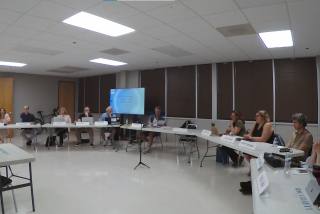Two-Member Board Is Taking a Gamble
- Share via
QUESTION: I am currently serving on the board of directors of a 36-unit community association. Our association is supposed to have a five-member board of directors; however, at the present time there is only one other board member who is actively involved with the association. The three other board members have either resigned or moved out of the complex.
Since we have only two board members, the two of us have been making decisions as needed without a board meeting. I am concerned about acting on behalf of the association when we do not have a legally constituted board of directors. There are major maintenance projects that are needed, but I want to be sure we are operating properly.
Can we appoint other board members? If no one else will volunteer, how do we run the association?
ANSWER: The procedure for filling board vacancies is usually found in the association’s bylaws. The bylaws explain how the board functions and how the meetings are to be conducted.
In most associations, the bylaws give the remaining board members the authority to appoint replacements for those who resign. You must read your bylaws to verify this because I have seen exceptions that require a special election in order to fill vacancies.
When you read your bylaws, you will probably find that, since you have a five-member board, at least three members must be in attendance in order to conduct a board meeting. If you and the other board member are making major decisions without board meetings, you can be accused of operating illegally.
Following the procedures in the bylaws, take the necessary steps to fill the vacancies. Perhaps you will want to send a written notice to all of the owners stating how the board vacancies are going to be filled. You need to find some volunteers who are willing to serve.
If you are unable to appoint or elect additional board members due to apathy, the association is sure to suffer from the lack of leadership. As you stated, maintenance projects are being delayed. This fact should convince some of the owners that they need to serve on the board in order to protect their investment.
Associations that flounder without adequate leadership may eventually find that one of the owners has petitioned for a court-appointed receiver to manage the business affairs. This is a sad fate for any association because receivership is costly. It could affect the resale values of the units because it is a warning sign to any potential buyer that the association is not organized and operating in the way that the legal documents intended.
Perhaps by warning your fellow association members of the dire consequences, you will be able to find the volunteers that are needed so the association can run properly.
A Letter From a Lawyer May Make the Board Act
Q: By reading your column, I’ve learned that homeowner associations are required to operate according to the law and the association’s legal documents. I have shown copies of some of your columns to the board of directors of the condominium where I live in order to inform them of my rights as an owner.
Unfortunately, they have ignored my written request for information, and they refuse to provide access to the association’s list of owners who are not paying the monthly assessments. I have reason to believe that one of the board members owes several hundred dollars in delinquent assessments.
I do not want to file a lawsuit against the board but what alternative do I have? What government agency must I contact?
A: If the board is ignoring your written requests for information, you may have to contact an attorney. Perhaps just receiving a letter from your attorney will be enough of a message to get the board’s attention.
There is no government agency that oversees a community association after the association has been turned over from the developer to the homeowner members’ control.
The California Department of Real Estate has regulations that govern how an association is to be organized and operated, but after the developer is gone, the DRE cannot solve your problems for you and your association.
I suggest that you urge the board of directors to contact an attorney who will represent the association. An attorney who specializes in community association law will be able to explain their fiduciary obligations as board members. If the association already has an attorney of record, you might want to send copies of your previous written requests for information to the attorney for her or his input.
Hickenbottom is past president of the Greater Los Angeles chapter of the Community Associations Institute (CAI), a national nonprofit research and educational organization. She welcomes readers’ questions, but cannot answer them individually. Readers with questions or comments can write to her in care of “Condo Q&A;,” Box 5068, Thousand Oaks, Calif. 91360.


